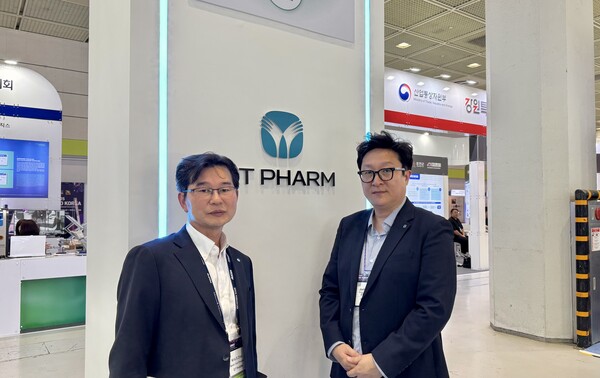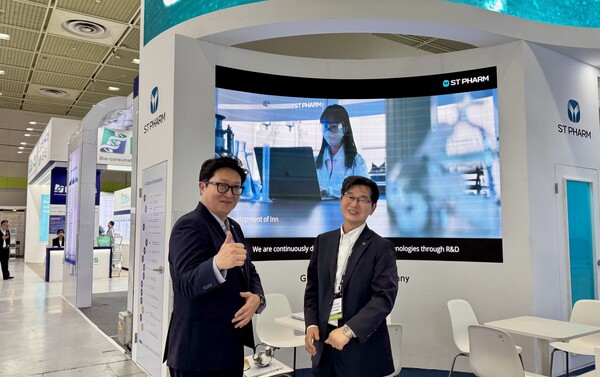ST Pharm is laying the groundwork for large-scale RNA production, with plans to expand oligonucleotide and mRNA manufacturing to the ton level as it courts early-stage biotech partners.
At BIO KOREA 2025, the Korean CDMO laid out a plan that sounds more like a launchpad than a roadmap: industrial-scale oligonucleotide production, preclinical tie-ups with global biotechs, and a proprietary mRNA platform it says can dodge the IP tripwires that have rattled other players in China and beyond.
A subsidiary of Dong-A Socio Group, ST Pharm handles small molecules, oligonucleotides and mRNA-LNPs. But now, it's preparing for output measured in tons. “One ton, five tons, maybe more,” said Kris Choi, senior vice president and head of marketing and business development in an interview with Korea Biomedical Review Thursday amid the bustle of back-to-back partnering meetings.
That scale, he noted, requires a different kind of infrastructure, but ST Pharm used the three-day event to scout local engineering firms and manufacturing experts. Some of those conversations paid off. “We didn’t think we’d find that expertise domestically,” he said. “But we have.”

Choi acknowledged that moving to industrial-scale RNA production comes with major operational unknowns. “The question is: how will this industry manage such scale? That’s one of our biggest internal challenges,” he said. “So we’re looking to learn -- how do biologics companies scale up? How do peptide players handle it?”
As Korea’s only oligo manufacturer, he added, ST Pharm is actively studying how companies in other modalities approach capacity and infrastructure. “That’s the kind of synergy we’re exploring.”
The company is also moving upstream. Kim Jee-hoon, team leader of strategic business planning within the marketing division, said ST Pharm is now working with biotech clients at the concept stage, particularly in mRNA and oligo programs. “We’re seeing more companies that want input before IND-enabling studies,” Kim said in the joint interview. “That gives us a chance to design for scalability from day one.”
As Big Pharmas start demanding deeper integration and biotechs stretch thinner on funding, Kim said ST Pharm is positioning itself not just as a service provider, but as a long-term ally that speaks both regulatory and chemistry.
Behind the scenes, ST Pharm is building aggressively. Its Smart Cap technology, designed to stabilize mRNA and improve expression, is already being pitched globally. Its proprietary lipid nanoparticle (LNP) delivery system -- alongside sequence library R&D and capping chemistry -- is, as Kim put it, “entirely in-house.”
Can others build these components? “Sure,” Kim said. “If you know your way around chemicals, you can make a cap or an LNP.”
“But can you make them without triggering a lawsuit? Can you scale them globally without crossing a patent boundary? That’s the real question.”
“Companies in China might look similar on paper,” Kim added. “But many of them are walking on a legal tightrope. We’re not.”

At BIO KOREA, ST Pharm kept things focused. The company scheduled around 20 meetings, Choi said, 80 percent of them international. “We’re not here for flash,” he said. “Even five strong leads would make it worth it. It’s about momentum, not headlines.” Choi added that the company plans to share booth space with affiliates STgen Bio and Dong-A ST at the BIO International Convention next month to present a unified front to global partners.
That momentum was already starting to show. A wave of Indian CDMOs and raw material suppliers stopped by the booth to explore what they could bring to the table, Kim said -- a small detail, but one that signals how the company’s profile is growing. “People know we’re building something,” Kim said. “And they want in.”
That said, ST Pharm isn’t immune to headwinds. First-quarter revenue rose just 1.4 percent to 52.4 billion won. Operating profit dropped 45.5 percent. Net profit? Down nearly 87 percent.
Choi said the drop was timing-related. Choi attributed the decline to shipment timing. “Some clients pushed deliveries from March into April,” he said. “It looks worse than it is.”
The company expects a second-half rebound as those orders are fulfilled and new contracts begin production. Still, Choi said leadership is focused on steady progress. “Last year was about preparation. This year is about delivery.”
Related articles
- [BIO KOREA 2025] With tariffs looming, Celltrion backs biologics push with US stockpile
- [BIO KOREA 2025] MSD bets big on Korean biotech for open innovation
- [BIO KOREA 2025] With GSK money in hand, ABL Bio guts old model and rebuilds in Gangnam
- [BIO KOREA 2025] Yuhan charts post-lazertinib future as FDA win fuels next-gen pipeline
- [BIO KOREA 2025] AstraZeneca brings BioVentureHub model to Korea with trust-first startup partnerships
- [BIO KOREA 2025] Insilico CEO pushes Korea to greenlight 1st anti-aging drug
- [BIO KOREA 2025] BIO KOREA turns 20 with global dealmaking in focus
- Dong-A ST profit soars as Stelara biosimilar launch drives Q1 gains at Dong-A Socio
- [BIO USA 2025] ST Pharm enters CRISPR CDMO market with high-purity guide RNA platform
- Dong-A Socio Holdings kicks off ESG supply chain program for 30 key partners

